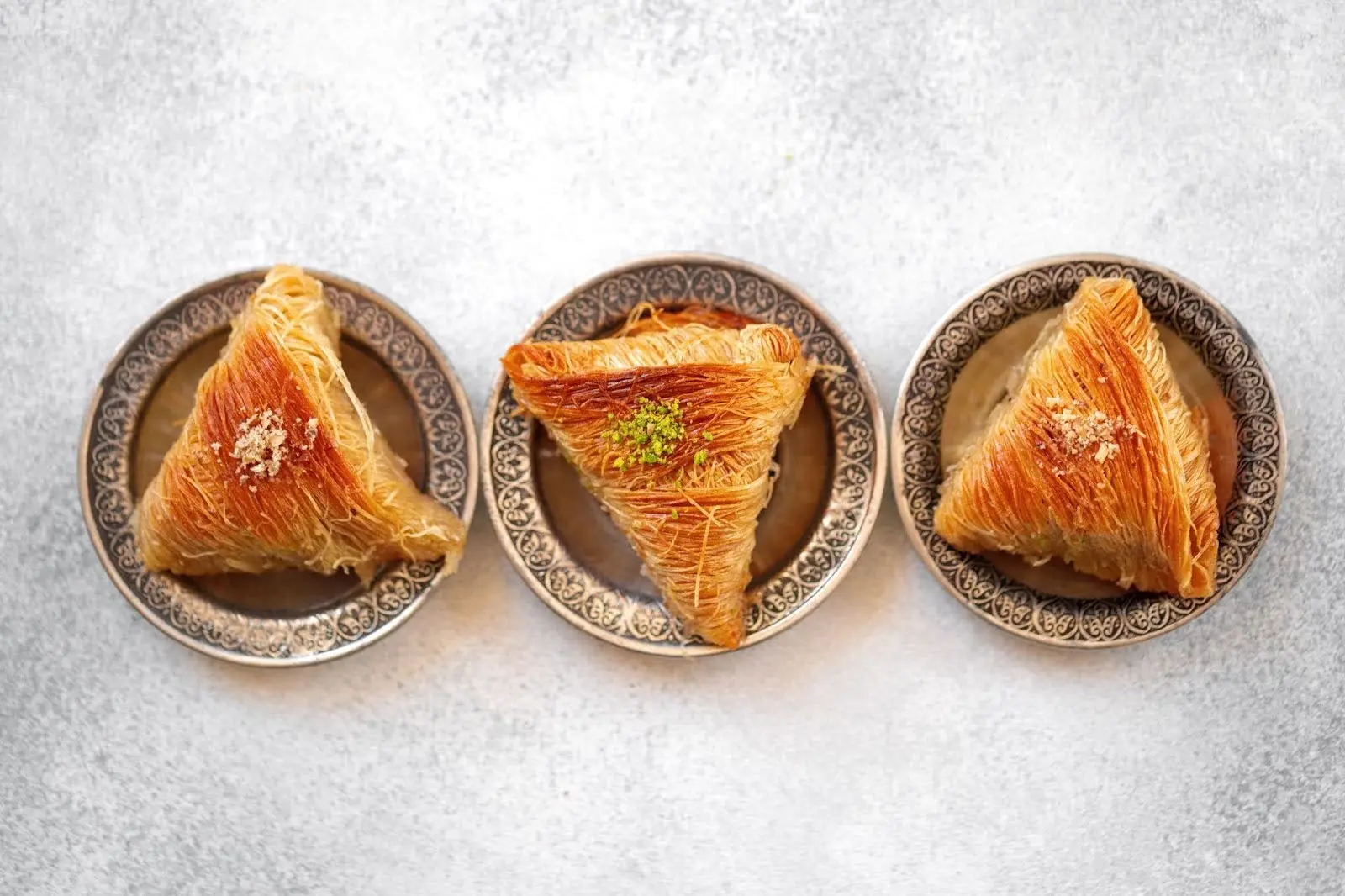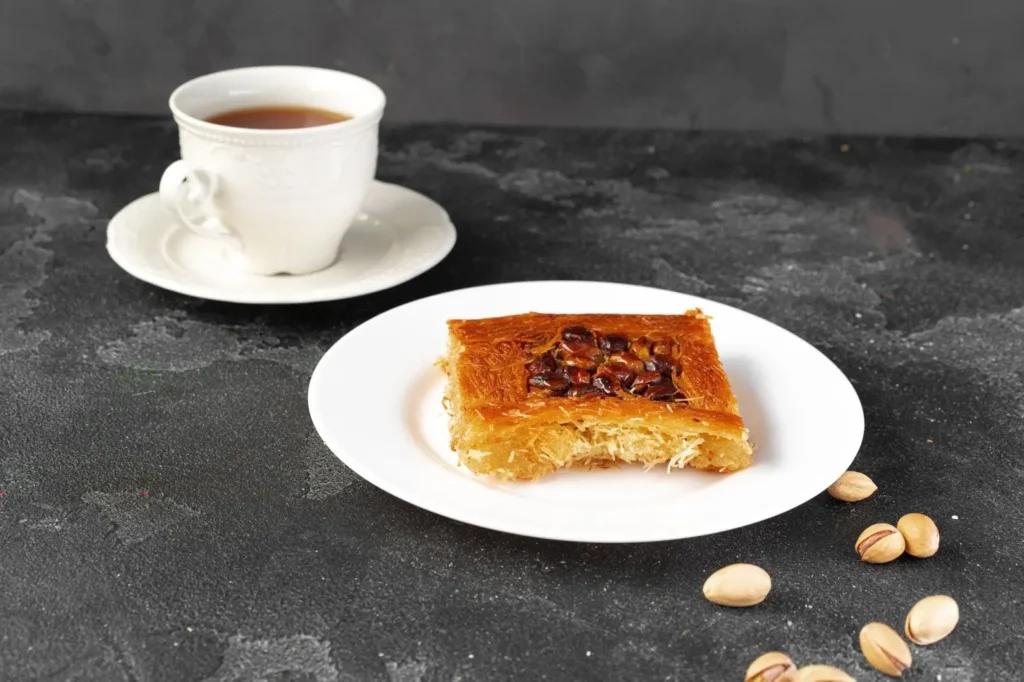Share on social media

Baklava, a sweet pastry from the Middle East, often sparks questions about its health impact. Is baklava healthy or harmful to your diet? The answer is not as straightforward as a simple yes or no.
To decode baklava’s health quotient, we must first understand its ingredients. Traditional baklava is made with layers of phyllo dough filled with chopped nuts and sweetened with honey syrup. Some variations may also include spices like cinnamon and cloves.
A piece of baklava contains 334 calories, and 100 grams contains 428 calories. Consider mindful consumption to enjoy this delightful dessert without hindering your weight management goals. Sharing a piece with friends or choosing smaller portions can help you savor baklava without the guilt of overindulgence. Understanding the calorie content lets you fit this treat into your diet wisely, ensuring balanced enjoyment.
Most of the calories in baklava come from fat, with a typical slice containing around 11 grams. But not all fats are created equal. The unsaturated fats in nuts like pistachios, a key ingredient in baklava, are good for you. They can help improve cholesterol levels and promote heart health. Choosing baklava made with nuts rich in unsaturated fats can make your indulgence not just delicious but also a healthier choice. These healthy fats are essential for various body functions, including brain health and hormone production.
Baklava is high in carbohydrates, with about 30 grams per serving. Most of these carbs come from sugars, with a smaller amount from the phyllo dough. Sugars give you quick energy but can also cause spikes in your blood sugar levels. Drinking unsweetened green tea with your baklava can help balance the sugar content and provide antioxidants, making it a great combo. The antioxidants in green tea can help protect your cells from damage and improve your overall health.
Baklava isn’t a significant protein source but provides around 3 grams per serving. Protein helps keep you full and supports muscle building. Pairing baklava with protein-rich foods like a dollop of Greek yogurt, a handful of almonds, or a glass of milk can make for a more balanced snack. This combination also helps slow down sugar absorption, giving you steady energy. Including protein in your diet is crucial for growth, repair, and maintaining muscle mass.
Baklava has small amounts of vitamins and minerals like potassium and sodium. Potassium is essential for maintaining healthy blood pressure, while sodium is needed for proper nerve and muscle function. While these nutrients are not significant in baklava, eating a diet rich in fruits, vegetables, and whole grains ensures you get all the essential nutrients your body needs. Adding fruits like berries or citrus slices to your baklava can boost the vitamin content and add a fresh contrast to its sweetness. These additional fruits provide fiber and essential vitamins that enhance the nutritional value of your dessert.
Baklava is incredibly tasty; you don’t have to avoid it altogether. Here are some tips for enjoying it in a balanced way:
Share a slice of baklava with friends or family, or enjoy a smaller piece yourself. Practicing portion control means being mindful of the amount of food you eat. Focusing on quality over quantity allows you to appreciate baklava’s intricate layers and flavors. This approach enhances your enjoyment while helping you avoid overeating. Moreover, sharing also makes the experience more fun and social. When you savor each bite and share with others, you create memorable experiences around food.
Pair baklava with unsweetened tea or coffee to balance the sweetness—the bitter notes in these drinks cut through the richness of baklava. Herbal teas like mint or rosewater, common in Mediterranean cuisine, offer a refreshing contrast to the sweetness. These drinks also have health benefits, such as aiding digestion and reducing inflammation, which can help counterbalance baklava’s high sugar and fat content. These beverages can also cleanse your palate and enhance the dessert experience.

Save baklava for special occasions or celebrations. This way, you can enjoy it without making it a regular habit. Baklava is a rich and indulgent dessert, and enjoying it occasionally as a treat helps you appreciate it more and keeps it from becoming an everyday indulgence. Special occasions make the enjoyment of baklava even more memorable. Celebrating with baklava can turn an ordinary day into a special one, adding joy and satisfaction to your life.
For a truly exceptional baklava experience, venture to Aladdin Houston, a renowned Mediterranean restaurant. Here, baklava is a dessert and a culinary masterpiece crafted with traditional recipes passed down through generations. Their chefs use high-quality nuts like pistachios and pure honey, elevating their baklava’s taste to another level. The attention to detail and commitment to authenticity make Aladdin Houston’s baklava a must-try, promising a dining experience that intrigues and excites you.
For convenience, Aladdin Houston also offers a to-go menu, which allows you to order your favorite dishes and enjoy them in the comfort of your home. Its catering menu is perfect for bringing the rich flavors of the Mediterranean to your next event or gathering. Whether it’s a family dinner or a corporate event, Aladdin Houston’s catering menu ensures that you and your guests can savor the authentic taste of Mediterranean cuisine.
Baklava is a delicious treat that can be enjoyed in moderation. However, it is high in calories and fats, so portion control and mindful eating are essential to include in a balanced diet. Knowing its nutritional content and pairing it with healthy foods allows you to enjoy baklava without compromising your diet.
Yes, baklava can be made with nuts such as pistachios, walnuts, and almonds. Each nut gives the dessert a unique flavor and texture. Trying different nuts can offer new taste experiences and allow you to customize the dessert to your liking.
Baklava should be kept in an airtight container at room temperature. It can also be refrigerated, but this might affect the phyllo dough’s texture. For the best taste and texture, eat it within a few days of making it.
Baklava can be enjoyed as an occasional treat on a healthy Mediterranean diet. Eating it in moderation and balancing it with other nutrient-rich foods is critical. Including baklava in a diet of fruits, vegetables, whole grains, and lean proteins helps maintain a healthy lifestyle.
Healthier alternatives to traditional baklava include using less sugar in the syrup, whole-grain phyllo dough, and nuts with more unsaturated fats, like pistachios. Natural sweeteners like honey or agave syrup can reduce the overall sugar content while keeping the dessert delicious.
You might like it